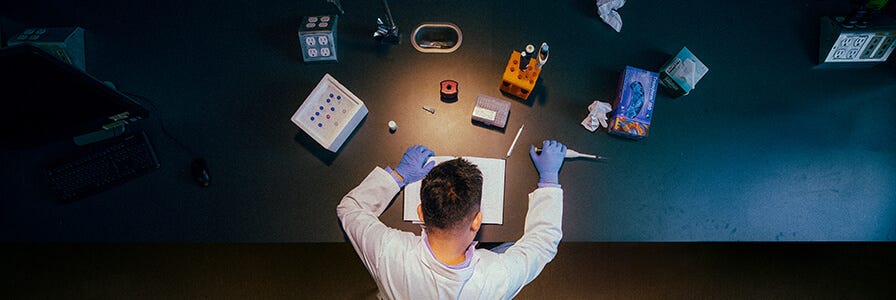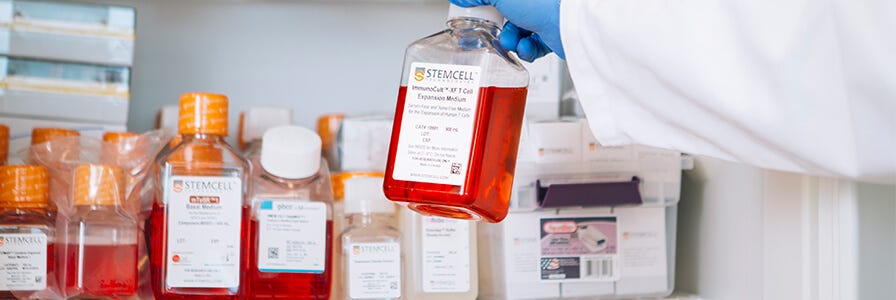A Scientist's Guide to Surviving Information Overload

Information overload is nothing new, but it’s getting more difficult for people, scientists included, to manage. Research has shown that, in 2007, the average person received a volume of information equivalent to 175 newspapers daily, compared to the equivalent of around 55 newspapers daily in 1986.1 This volume has continued to increase as information has become more plentiful and accessible with continued advancements in information technology.
In his book, The Organized Mind: Thinking Straight in the Age of Information Overload, neuroscientist Daniel J. Levitin highlights the problem this deluge of information has on modern society: We are expected to make decisions faster and more often every day.2 How can we screen out excess information and effectively process what’s relevant in a world where the sea of information is constantly expanding?
Information overload may be an even greater challenge for scientists, who are inherently information seekers. As a scientist, it can be challenging to retain and organize all of the information you have to manage. This could include various protocols, experimental data, findings from the last few papers you read, the last seminar you attended, and your reagent inventory.
While you can’t escape information overload as a scientist, there are some ways to deal with it.
Limit the information you have to process and actively manage
It would be surprising if you haven't felt overwhelmed by the amount of data you are bombarded with on a daily basis. A report from 2012 estimates that 1.8 million scientific articles are produced each year alone3—this is almost 5,000 papers each day. Whether or not you are conscious of it, your brain is constantly filtering through information and assessing if it’s worth retaining. This in itself can be exhausting.
How can you manage all of this information? Outsource some of the work. Take a load off your brain and use external tools to free up your mental space.
- Keep to-do lists, such as on a board with post-it notes or with an app on your phone.
- Use physical cues as reminders. For example, if you run out of a reagent, place the empty container or the label beside the computer so you will remember to order more.
- When searching for papers, use filters in search engines to pre-screen the information you need to process. Subscribing for Science News is a great way to receive curated content relevant to your field of interest.
- Start a journal club. Share the burden of information overload by taking turns reviewing every paper in detail and providing concise summaries of key findings.
Get the Most Out of Journal Clubs
Share what you read with your colleagues by participating in journal clubs.
Stop Multitasking
Multitasking, doing more than one task at a time, can seem like a good idea when you need to process multiple sources of information. Perhaps you’re doing an experiment that doesn’t require your full attention so you’re reading a paper, checking your emails, and changing the radio station on the side.
In actuality, multitasking takes a toll on productivity. Research has found that only 2.5% of individuals do not show performance decrements when multitasking.4
Attention is a limited resource. You may feel like you’re getting more done when you juggle multiple experiments at once, but there are constraints to human attention.5 In addition to causing mental fatigue, do you really want to risk jeopardizing your experiment (which may have taken you weeks to prepare for) by multitasking?
To focus on one task at a time, minimize the temptation to multitask by removing distractions
- Block out periods of uninterrupted time to work and focus on one task. Put your phone out of sight and remove other distractions from your surroundings so you won’t feel the desire to multitask.
- Don’t read emails as soon as they arrive. Instead, set dedicated periods of time during the day to respond to emails.
- Limit the notifications that come up on your computer, such as new email notifications.
Eight Counter-Productive Habits that Researchers Should Break
Stop these counter-productive habits that could be holding you back from moving your research and career forward.
Organize your surroundings
There are pipettes scattered across the lab bench, shelves lined with buffers made three years ago, and a refrigerator filled with vaguely labeled tubes. On top of that, there are lab notebooks everywhere and half of them don’t belong to any current lab members. Does this sound familiar?
If you feel that a cluttered workspace affects your productivity, you’re not alone. In The Organized Mind, Daniel Levitin points out that there’s a part of the brain dedicated to remembering the spatial location of items. He also notes that your brain uses more energy as the number of items you keep track of increases.2 Research suggests that clutter can raise levels of the stress hormone cortisol and that a disorganized workplace can lead to decreased productivity.6
Ultimately, disorganized surroundings reflect in a disorganized mind. In fact, researchers at Princeton University found that physical clutter can compete for your attention and cause increased stress levels and decreased performance.7
To combat the effects of clutter, tidy up your workspace.
- Keep a "junk drawer" in the lab to store miscellaneous items in your lab that defy categorization. This way, you won’t have to spend a long time looking for things like batteries, zip ties, and plastic bags.
- Organize your lab space. Label drawers and shelves in your lab so you know exactly where you can find everything.
- Maintain a clean workspace. Take some time each day to clean up your immediate workspace and remove clutter.
Avoid decision fatigue
In The Organized Mind, Daniel Levitin states that the average supermarket in 2014 stocked 40,000 items, compared to just 9,000 items in 1976.2 These extra choices mean that the average modern consumer must make more decisions than ever before. Similar trends are likely for scientific tools and products, adding to the information load facing researchers.
Making decisions comes at a cost. Too many choices can lead to decision fatigue, which can drain your ability to focus and prevent you from making good decisions.8 It isn’t practical to commit mental energy to every decision you’re faced with on a daily basis. You need to prioritize those that will have the greatest impact.
- If you have to make a big decision, try to tackle it early in the day before decision fatigue has the chance to set in.
- Review your to-do list, and identify which items have the most significant impact on your goals. Prioritize decisions for those tasks first. Read more tips on managing your time >
- When making decisions, prioritize efficiency. For example, if you’ve narrowed down choices for protocols or technologies that will give you the same results, choose efficiency.
Featured Resources
A Smarter Way to Isolate Immune Cells
Immunology Research Resource Center
Tips and Tricks for Working Smart in the Lab
References
- Hilbert, M. How Much Information Is There in the Information Society? Signif (Oxf). 2012, 9, 8-12.
- Levitin, D. The Organized Mind: Thinking Straight in the Age of Information Overload; Dutton Penguin Random House: New York, 2014.
- Ware, M.; Mabe, M. The STM Report: An Overview Of Scientific And Scholarly Journal Publishing; International Association of Scientific, Technical and Medical Publishers: The Netherlands, 2012.
- Watson, J. M.; Strayer, D. L. Supertaskers: Profiles in Extraordinary Multitasking Ability. Psychon. Bull. Rev. 2010, 17, 479-485.
- Alzahabi, R.; Becker, M. W. The Association Between Media Multitasking, Task-Switching, and Dual-Task Performance. J. Exp. Psychol. Human. 2013, 39, 1485-1495.
- Saxbe, D. E.; Repetti, R. No Place Like Home: Home Tours Correlate With Daily Patterns of Mood and Cortisol. Pers. Soc. Psychol. Bull. 2009, 36, 71-81.
- McMains, S.; Kastner, S. Interactions of Top-down And Bottom-up Mechanisms in Human Visual Cortex. J. Neurosci. 2011, 587-597.
- Baumeister, R. F. The Psychology of Irrationality. In The Psychology of Economic Decisions; Brocas, I.; Carrillo, J. D., Eds.; Oxford University Press Inc.: New York, 2002; Vol. 1, pp 3-16.








